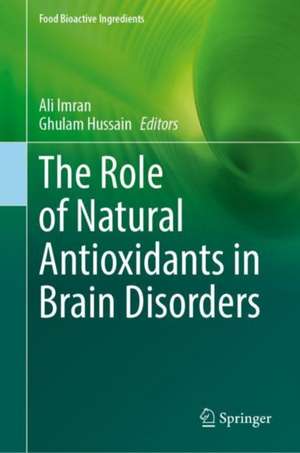The Role of Natural Antioxidants in Brain Disorders: Food Bioactive Ingredients
Editat de Ali Imran, Ghulam Hussainen Limba Engleză Hardback – 17 oct 2023
The Role of Natural Antioxidants in Brain Disorders describes various neuroprotective effects and their physiological phenomenon mediated by antioxidants to maintain and regulate the general health biomarkers against brain disorders. The important role of antioxidants, diet and lifestyle in managing brain disorders is covered, as is their use in conjunction with conventional therapies against oxidative stress. Both exogenous and endogenous antioxidants are explored in full. By focusing on the role of oxidative stress as a triggering mechanism for various brain disorders and the use of antioxidant foods in conjunction with traditional therapies in combating and preventing them, this is a valuable source for researchers in food science, nutrition, health science and physiology.
Preț: 1113.89 lei
Preț vechi: 1358.41 lei
-18% Nou
Puncte Express: 1671
Preț estimativ în valută:
213.14€ • 232.25$ • 179.60£
213.14€ • 232.25$ • 179.60£
Carte tipărită la comandă
Livrare economică 23 aprilie-07 mai
Preluare comenzi: 021 569.72.76
Specificații
ISBN-13: 9783031411878
ISBN-10: 3031411870
Pagini: 286
Ilustrații: VIII, 286 p. 42 illus. in color.
Dimensiuni: 155 x 235 mm
Greutate: 0.59 kg
Ediția:1st ed. 2023
Editura: Springer International Publishing
Colecția Springer
Seria Food Bioactive Ingredients
Locul publicării:Cham, Switzerland
ISBN-10: 3031411870
Pagini: 286
Ilustrații: VIII, 286 p. 42 illus. in color.
Dimensiuni: 155 x 235 mm
Greutate: 0.59 kg
Ediția:1st ed. 2023
Editura: Springer International Publishing
Colecția Springer
Seria Food Bioactive Ingredients
Locul publicării:Cham, Switzerland
Cuprins
An Introduction: Overview of Nervous system and Brain Disorders.- Pathophysiological Mechanisms of Brain Disorders.- Physiological Significance of Oxidative Stress and Anti-oxidative System.- Oxidative Stress as a triggering Mechanism of Various Diseases.- Chief Role of Neuroinflammation and Oxidative Stress in Brain Disorders.- Available Treatment Modules of Brain disorders.- Antioxidants Mitigate Oxidative Stress: A General Overview.- Role of Endogenous and Dietary Antioxidants in Brain Disorders.- Antioxidants as an Adjuncts to Conventional Therapies against Oxidative Stress.- Role of Antioxidants, and Life Style in Managing Brain Disorders Oxidative Stress Biomarkers and Antioxidant Treatments in Brain Diseases.- Clinical use of antioxidants for the treatment of Brain disorders.
Notă biografică
Dr. Ali Imran is a Professor in the Department of Food Sciences at Government College University in Faisalabad, Pakistan
Dr. Ghulam Hussain is a Professor in the Department of Physiology at Government College University in Faisalabad,Pakistan
Textul de pe ultima copertă
Oxidative stress and neuroinflammation are considered causative factors in various neurological disorders such as Parkinson’s and Alzheimer’s diseases. Antioxidants are chemicals that bind with oxidative species and nullify their effect from causing damage to biological molecules. Endogenous antioxidants are produced by our body, however most of them are obtained from external sources, primarily through diet, called dietary antioxidants. Major sources of antioxidants are brightly colored fruits, vegetables, cereals, legumes, and herbs. Other very effective sources are berries, green tea, and dark chocolate. These compounds have the potential to hinder neurodegeneration, reduce neuronal death and improve memory as well as cognitive functions. Based on the complex nature of antioxidants and oxidative stress, particular antioxidants such as vitamin E, vitamin C or β-carotene are beneficial in protecting cells, organs and tissues against oxidative damage.
The Role of Natural Antioxidants in Brain Disorders describes various neuroprotective effects and their physiological phenomenon mediated by antioxidants to maintain and regulate the general health biomarkers against brain disorders. The important role of antioxidants, diet and lifestyle in managing brain disorders is covered, as is their use in conjunction with conventional therapies against oxidative stress. Both exogenous and endogenous antioxidants are explored in full. By focusing on the role of oxidative stress as a triggering mechanism for various brain disorders and the use of antioxidant foods in conjunction with traditional therapies in combating and preventing them, this is a valuable source for researchers in food science, nutrition, health science and physiology.
Caracteristici
Provides mechanistic insight into the pathology and epidemiology of brain disorders Covers antioxidant-based remedies for various brain disorders Outlines the sources of antioxidants used as remedies for brain disorders









